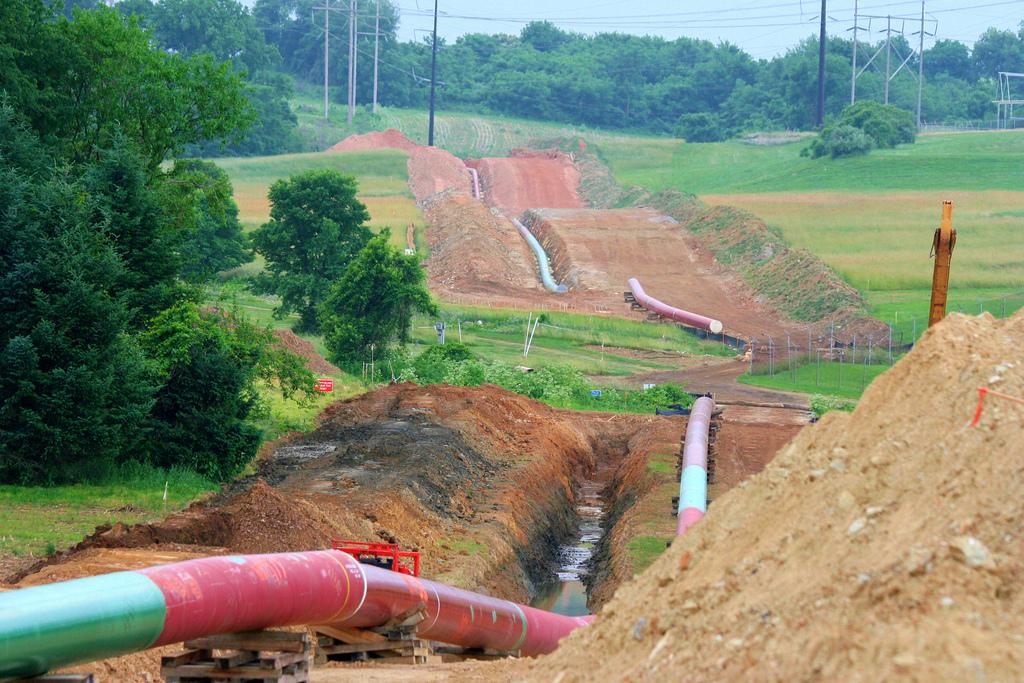A proposed Ohio gas pipeline is raising safety and property rights concerns for landowners in Ohio
A gas pipeline under construction in York, Pennsylvania
Paul Gierosky isn’t what you might expect in an anti-pipeline activist.
He’s a businessman. He and his wife, Elizabeth, have been renovating their dream home in fast-growing Medina County, in northeastern Ohio, for the past two years. But before they even finished moving in, the Gieroskys got a notice: Their new property was in what’s called a "study corridor" for the Nexus pipeline.
The pipeline, a joint venture of DTE Energy of Michigan and Spectra Energy of Houston, would run 250 miles from gas wells in southeast Ohio across Michigan and into Canada — through the Gierosky’s property, as well as hundreds of others.
The gas companies want to survey the Gierosky’s front yard to see if they can dig it up to lay their new line. The more the Gieroskys looked into it, the more upset they got.
“Our first concern started out to be safety,” Paul Gierosky says. “The experts are saying there’s so much pressure that the heat that’s going to come through a small crack or small orifice is going to self-ignite — so we’re going to have an explosion.”
Pipeline explosions are relatively rare in the US, but as pipelines age and the population surrounding them grows, they are becoming what one expert calls "high-consequence" events. And with about 130 inspectors assigned to oversee nearly 2.5 million miles of pipeline in the US, proponents of pipeline safety say there is no way to know how well, or even if, many gas companies are doing the necessary inspections and repairs. Gas companies say they are doing everything possible to ensure public safety.
The Gieroskys and a coalition of other concerned citizens from Ohio have joined together to try to get the Nexus pipeline rerouted through a less densely populated area. And they’ve convinced many local township and county governments to join them.
Some 300 concerned landowners, farmers, local officials and others showed up at a recent public meeting held by Nexus. About 100 blue-shirted Nexus representatives were there, ready to answer questions. Still, resident Maureen Hardy was disheartened.
Hardy got notice in recent months that a gas compressor station was planned near her house. She didn’t even know what that was. But she’s worried that it's loud and polluting. “I’ve talked to several different people from Nexus and gotten several different answers,” she says.
Compressor stations keep gas flowing along a pipeline. The noise these stations generate has been a contentious issue in states like Pennsylvania, where the Marcellus Shale has propelled the extraction of natural gas to record levels. Air pollution from these stations is another issue state agencies are trying to grapple with.
Nexus spokesman Arthur Dietstel says the company will be holding more meetings to hear public concerns before finalizing the pipeline route. “There’s nothing set in stone. This route will continue to evolve over the course of the next year,” he says.
Nexus has started the permitting process through the Federal Energy Regulatory Commission, which needs to approve the pipeline route. Some landowners don’t believe FERC will address their concerns. Mario Pasolini, who lives in Seville, a small farming community, says he is sure FERC will approve Nexus.
“There's no doubt about it. They’re in the business to rubber stamp pipelines,” Pasolini says. He plans to fight Nexus in court. If they try to take his property, he will argue that eminent domain is only supposed to be used when land is set aside for public use, like a highway or railroad. Pasolini says the gas is heading for Canada and isn’t going to be a public good in Ohio.
“This is a private, Fortune 500 company — and they’re in this to make money,” Pasolini contends.
Nexus says they’re already talking with possible gas customers along the pipeline route. They plan to submit a formal application to FERC later this year.
This article is based on a story reported by Julie Grant, with the public radio program, the Allegheny Front. The story aired on PRI's Living on Earth with Steve Curwood.
The story you just read is not locked behind a paywall because listeners and readers like you generously support our nonprofit newsroom. If you’ve been thinking about making a donation, this is the best time to do it. Your support will get our fundraiser off to a solid start and help keep our newsroom on strong footing. If you believe in our work, will you give today? We need your help now more than ever!
